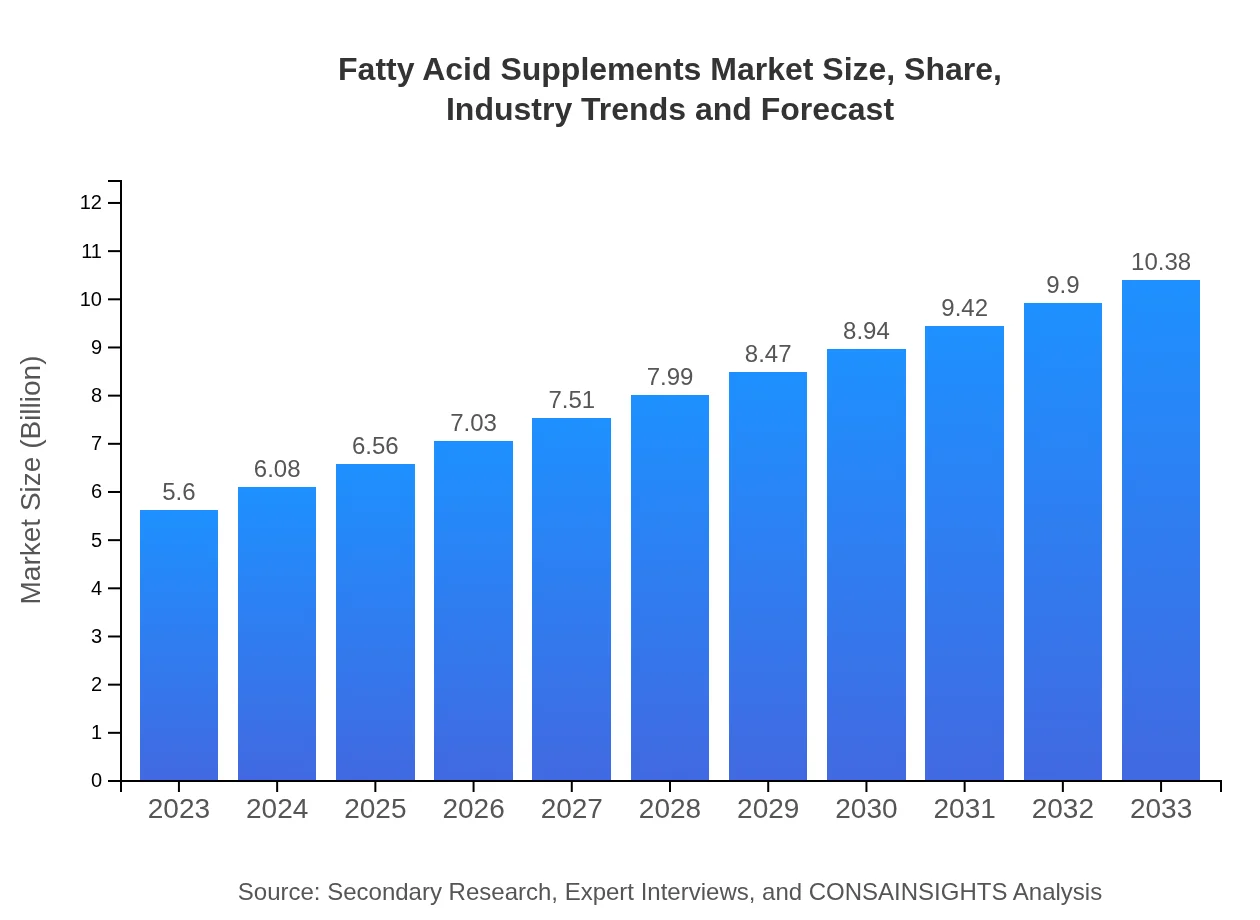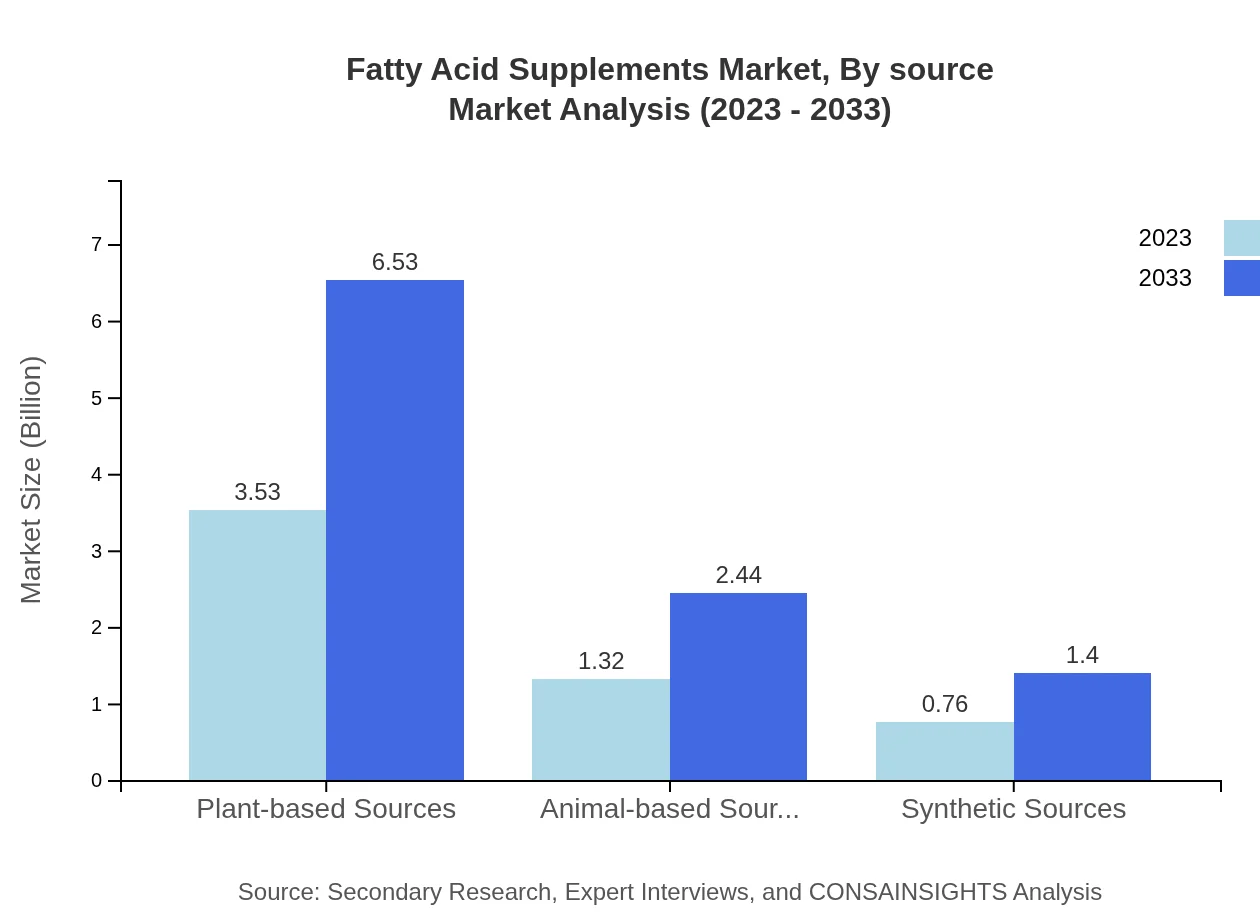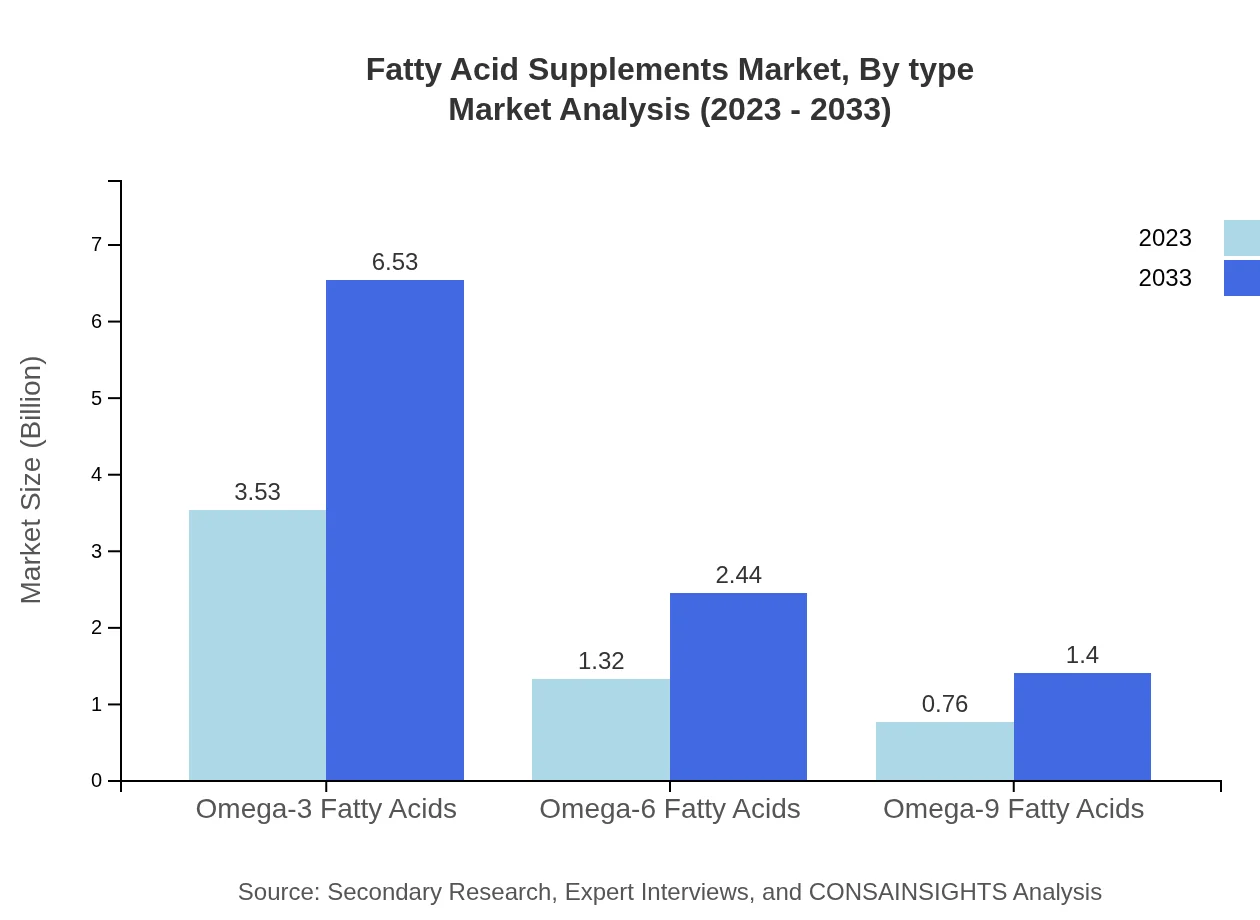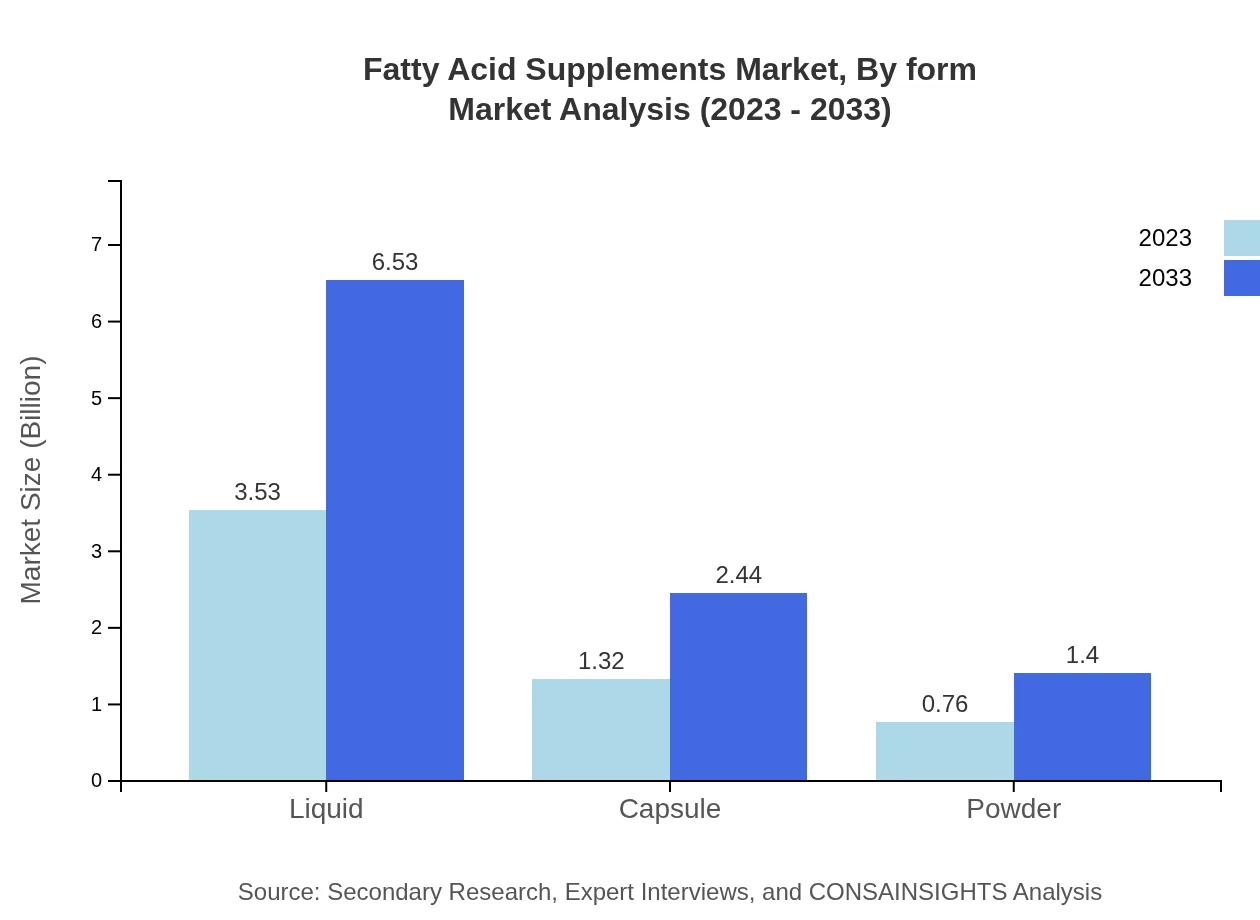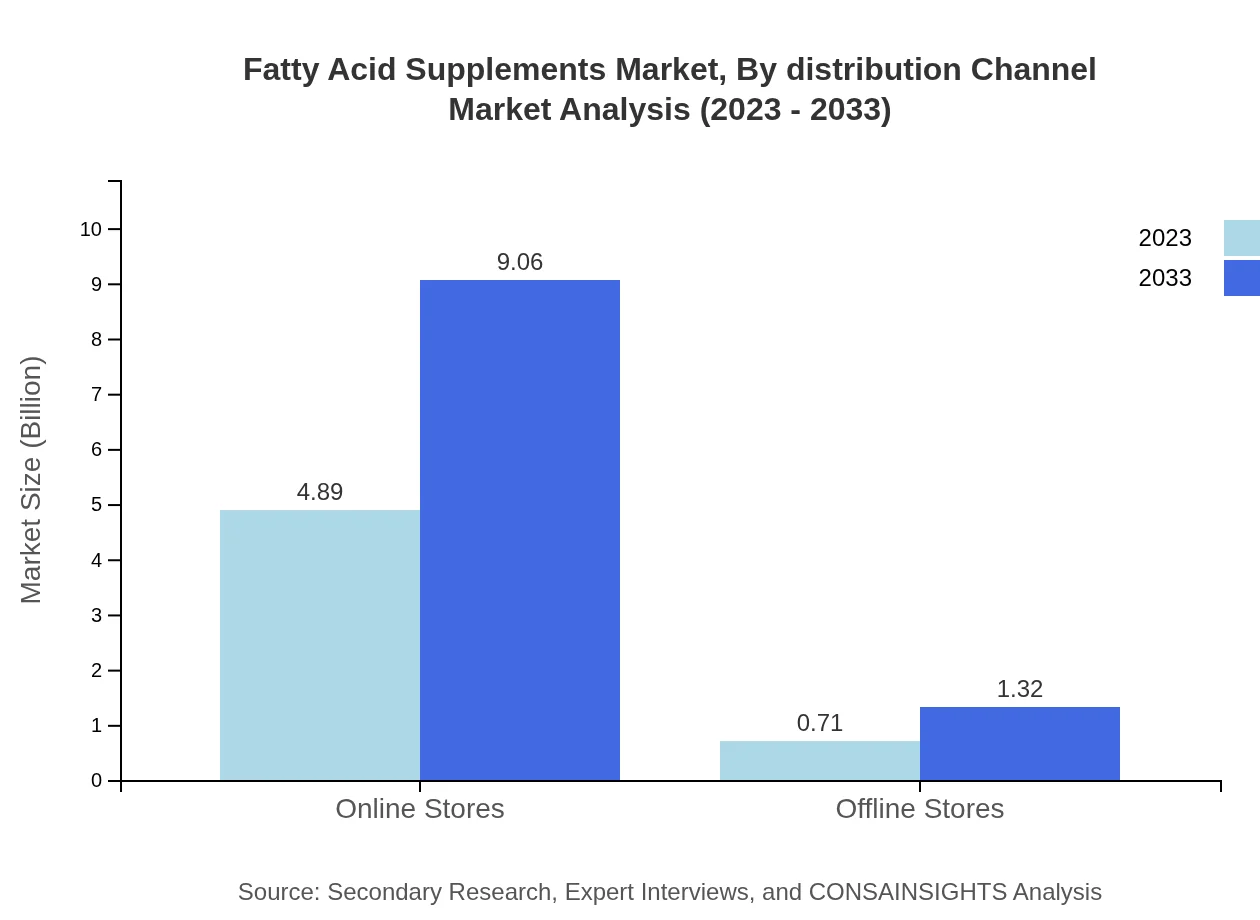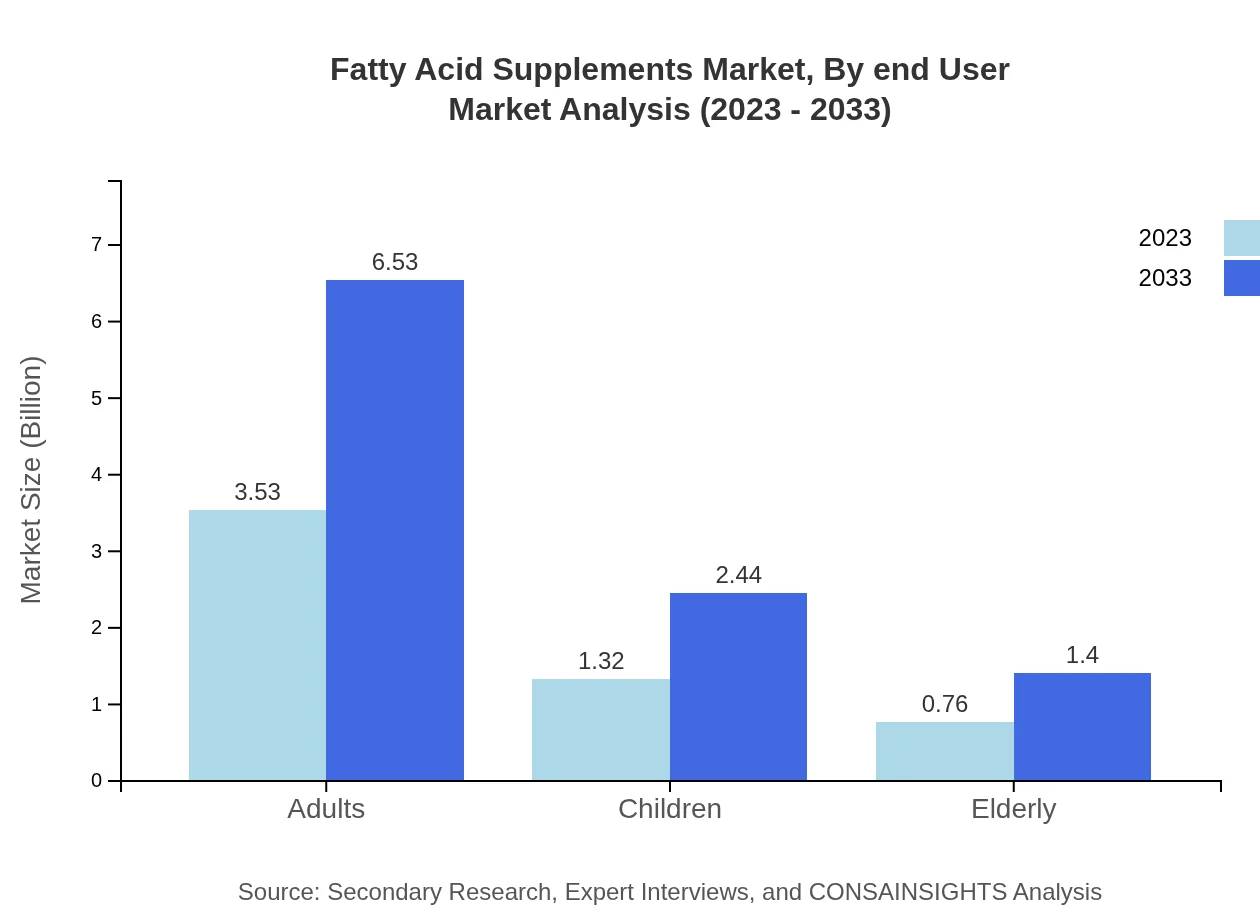Fatty Acid Supplements Market Report
Published Date: 31 January 2026 | Report Code: fatty-acid-supplements
Fatty Acid Supplements Market Size, Share, Industry Trends and Forecast to 2033
This report provides a comprehensive overview of the Fatty Acid Supplements market, analyzing current trends, growth factors, and market dynamics. The insights are supported by data and forecasts from 2023 to 2033, focusing on market size, regional analysis, segmentation, and key industry players.
| Metric | Value |
|---|---|
| Study Period | 2023 - 2033 |
| 2023 Market Size | $5.60 Billion |
| CAGR (2023-2033) | 6.2% |
| 2033 Market Size | $10.38 Billion |
| Top Companies | DSM Nutritional Products, Cargill, Inc., BASF SE, NOW Foods, Nordic Naturals |
| Last Modified Date | 31 January 2026 |
Fatty Acid Supplements Market Overview
Customize Fatty Acid Supplements Market Report market research report
- ✔ Get in-depth analysis of Fatty Acid Supplements market size, growth, and forecasts.
- ✔ Understand Fatty Acid Supplements's regional dynamics and industry-specific trends.
- ✔ Identify potential applications, end-user demand, and growth segments in Fatty Acid Supplements
What is the Market Size & CAGR of Fatty Acid Supplements market in 2023?
Fatty Acid Supplements Industry Analysis
Fatty Acid Supplements Market Segmentation and Scope
Tell us your focus area and get a customized research report.
Fatty Acid Supplements Market Analysis Report by Region
Europe Fatty Acid Supplements Market Report:
The European market is also projected for robust growth, advancing from $1.90 billion in 2023 to approximately $3.52 billion in 2033. Factors such as increasing consumer preference for natural and organic supplements, stringent regulations on supplement quality, and rising geriatric populations contribute to this growth.Asia Pacific Fatty Acid Supplements Market Report:
The Asia Pacific market for fatty acid supplements is projected to grow from approximately $1.05 billion in 2023 to $1.95 billion in 2033. This growth is fueled by increasing health awareness, rapid urbanization, and a rising trend of preventive healthcare. The region's diverse dietary practices coupled with a burgeoning fitness culture are significantly boosting the demand for these supplements.North America Fatty Acid Supplements Market Report:
North America will remain a leading region in the fatty acid supplements market, with a size projected to grow from $1.84 billion in 2023 to $3.40 billion by 2033. This growth is attributed to high health consciousness among consumers, widespread acceptance of dietary supplements, and the presence of major industry players that drive innovation.South America Fatty Acid Supplements Market Report:
In South America, the fatty acid supplements market is expected to rise from $0.14 billion in 2023 to $0.26 billion by 2033. The growth is driven by an increasing emphasis on health and wellness, alongside rising disposable incomes that enable higher expenditure on dietary supplements. Awareness campaigns regarding the benefits of fatty acids are also contributing to market expansion.Middle East & Africa Fatty Acid Supplements Market Report:
In the Middle East and Africa, the market is set to increase from $0.67 billion in 2023 to $1.25 billion by 2033. This growth is stimulated by an evolving healthcare landscape, increased awareness of nutritional supplementation, and growing middle-class consumer base willing to invest in health.Tell us your focus area and get a customized research report.
Fatty Acid Supplements Market Analysis By Source
The Fatty Acid Supplements market is segmented by source into three categories: Plant-based, Animal-based, and Synthetic. In 2023, Plant-based Sources command a substantial portion of the market with $3.53 billion, anticipated to remain predominant, growing to $6.53 billion by 2033. Animal-based Sources contribute $1.32 billion in 2023, increasing to $2.44 billion in 2033. Synthetic Sources, while smaller at $0.76 billion currently, are projected to grow to $1.40 billion during the same period. This reflects the growing consumer inclination toward natural and sustainable sourcing.
Fatty Acid Supplements Market Analysis By Type
By product type, Omega-3 Fatty Acids dominate the market, with a size of $3.53 billion in 2023, projected to expand to $6.53 billion in 2033. Omega-6 Fatty Acids currently account for $1.32 billion, with expectations to grow to $2.44 billion. Lastly, Omega-9 will rise from $0.76 billion to $1.40 billion, indicating a generally positive outlook across all fatty acid types in alignment with health trends centering around heart health and inflammation.
Fatty Acid Supplements Market Analysis By Form
In terms of product form, Liquid supplements represent the largest share with a market value of $3.53 billion in 2023, maintaining a steady growth trend and anticipating a size of $6.53 billion by 2033. Capsules and Powder forms follow, starting from $1.32 billion and $0.76 billion in 2023, respectively, and projected to reach $2.44 billion and $1.40 billion by 2033. The trend reflects the consumer preference for convenience and palatability in supplement consumption.
Fatty Acid Supplements Market Analysis By Distribution Channel
Distribution channels for Fatty Acid Supplements are segmented into Online and Offline. Online stores dominate with a market size of $4.89 billion currently and are expected to reach $9.06 billion by 2033, driven by e-commerce convenience and expansive consumer reach. Offline stores currently valued at $0.71 billion, are projected to grow moderately to $1.32 billion, as traditional retail continues adapting to the digital shift.
Fatty Acid Supplements Market Analysis By End User
The market is also analyzed based on end users: Adults constitute the largest share, valued at $3.53 billion in 2023 and projecting upward to $6.53 billion by 2033. Children, starting from $1.32 billion, represent a growing segment with a projection of $2.44 billion. Elderly users, starting from $0.76 billion, are also expected to increase to $1.40 billion, reflecting the rising demand for supplements tailored to various demographic needs and health conditions.
Fatty Acid Supplements Market Trends and Future Forecast
Tell us your focus area and get a customized research report.
Global Market Leaders and Top Companies in Fatty Acid Supplements Industry
DSM Nutritional Products:
Leading global supplier of vitamins, carotenoids, and omega-3 fatty acids, DSM focuses on innovation, high-quality products, and sustainability in health supplements.Cargill, Inc.:
A major player in the food and nutrition sector, Cargill offers a diverse range of omega-3 fatty acid products focusing on health benefits and sustainable sourcing.BASF SE:
BASF SE is a leading manufacturer of chemical and biological products, offering a wide range of supplements including omega fatty acids, emphasizing sustainability and health-oriented developments.NOW Foods:
NOW Foods is well-known for its natural products and supplements, including a comprehensive line of fatty acids, recognized for product quality and customer satisfaction.Nordic Naturals:
Specializing in omega-3 supplements, Nordic Naturals is committed to quality sourcing and superior delivery methods to ensure efficacy and freshness of their products.We're grateful to work with incredible clients.









FAQs
What is the market size of fatty Acid Supplements?
The global market size for fatty acid supplements was valued at approximately $5.6 billion in 2023, with a projected compound annual growth rate (CAGR) of 6.2%. This growth indicates a burgeoning demand for health-conscious nutritional products.
What are the key market players or companies in the fatty Acid Supplements industry?
The fatty-acid-supplements industry features major players such as Omega Protein Corporation, BASF SE, and DSM Nutritional Products. These companies are recognized for their innovation in developing high-quality supplements to meet consumer health needs.
What are the primary factors driving the growth in the fatty Acid Supplements industry?
Key factors driving market growth include rising health consciousness among consumers, increased prevalence of chronic diseases, and growth in the geriatric population. Additionally, the expanding vegan and vegetarian trends contribute to the demand for plant-based fatty acids.
Which region is the fastest Growing in the fatty Acid Supplements?
Europe is the fastest-growing region in the fatty acid supplements market, projected to grow from $1.90 billion in 2023 to $3.52 billion by 2033, reflecting a strong regional focus on health and wellness products.
Does ConsaInsights provide customized market report data for the fatty Acid Supplements industry?
Yes, ConsaInsights offers customized market report data for the fatty-acid-supplements industry. Clients can request tailored insights that cater to specific market needs, preferences, and business strategies.
What deliverables can I expect from this fatty Acid Supplements market research project?
From the fatty-acid-supplements market research project, you can expect comprehensive market analysis reports, growth forecasts, competitive landscape assessments, and insights on key industry trends and consumer preferences.
What are the market trends of fatty Acid Supplements?
Current market trends include a shift towards plant-based sources of fatty acids, increasing online sales channels, and rising consumer awareness regarding the health benefits of Omega-3 and Omega-6 fatty acids, fueling sustained market growth.

